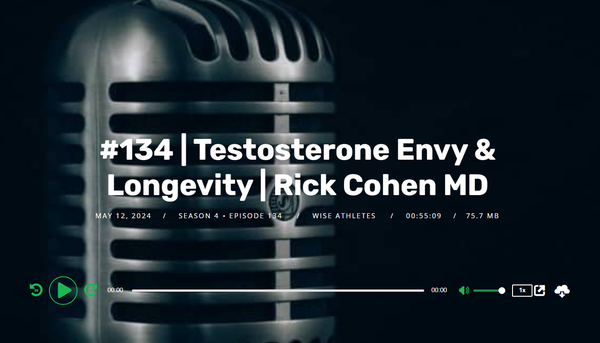
#134 | Testosterone Envy & Longevity | Rick Cohen MD
Should I take TRT? Should my testosterone be higher? I’ve been thinking about testosterone for 15 years, and of course the issue goes way beyond athletic performance enhancement … wise athletes have serious questions about testosterone’s impact on health and longevity. We all want to be better athletes, to be stronger and recover like we used to. Is there a way to boost testosterone that gives me all the benefits of getting back to my youthful levels of testosterone without injuring my ability to be a strong and healthy athlete throughout a long life? To answer those questions and more, on Episode 134 I am rejoined by Rick Cohen MD, a longevity and hormone health expert who works with athletes of all ages to find a safe and sustainable path to being the strong athlete we all want to be.
Bullet points
-
On one hand, there’s the TRT advocates who say “everyone should have 1000 ng/dl testosterone”…”don’t let your doctor scare you”….these guys usually also say ..”come to my low-T clinic”….or “buy my testosterone book”…These guys focus on making HIGH T a badge of honor and promote “testosterone envy”…
-
But just as annoying is the old school doctor who says…aging is natural, and falling sex hormones is a normal part of the life trajectory that everyone goes through. People need to get used to these changes. See a psychiatrist if you need help. This group deals in fear… talks about getting cancer and losing natural testosterone production
-
Testosterone Envy is bogus: Higher T is not better unless it is too low. Too high is not healthy but too low is also bad.
-
Each man has a T level that suits his body. The body works hard to maintain the “right” level of sex hormones (symptoms tell the story better than blood tests).
-
But current T level is affected by two overlapping buckets of issues: (1) health status (chronic inflammation, low mitochondrial function) and modern life issues (constant stress, sedentary lifestyles, nutrient shortages, medicines)
-
Adding in TRT creates a lot of side effects that have to be worked out plus it is a lifetime commitment to continuing it because the body will stop making its own T. This should be the action of last resort, not the first or second action
-
The body knows what to do….i just need to make myself as healthy as possible, and not screw up the program by not providing enough of the right nutrients and stimulus for my body to recognize that a “strong Joe” amount of testosterone is warranted.
-
Get sleep, move, lift heavy things, get off of toxic foods, don’t over-train…quick fixes. Lifting heavy and sprinting are the big levers.
-
Fasting all the time isn’t a good idea, but periodic fasting can fit into a good overall program of repeating cycles of growth and repair
-
Traditional low testosterone symptoms: falling asleep after dinner, no sex drive, no motivation to exercise, losing muscle mass, no morning wood.
-
Low T is the warning light that something is wrong. You have to fix the problem to signal the body to go back to making a desirable level of testosterone.
-
Sometimes people need a short treatment of medication to stimulate natural T production to boost motivation and mood so that they can do what is needed to do to increase testosterone production back to normal without drugs. Enclomiphene. Human chorionic gonadotropin (hCG).
-
Supplements mentioned: Akarkara root, Pine pollen, Tongat Ali
-
Do not take iron supplements. Donate blood to keep iron from getting too high.
Related info and episodes:
More Dr Rick Cohen info:
-
Pure Clean Performance website: Lab Assessments & Supplements
Want to support the show?
If you are enjoying WiseAthletes, a great way to support the show is by leaving a review on the Apple Podcasts. It only takes a minute and helps more people find the episodes.

